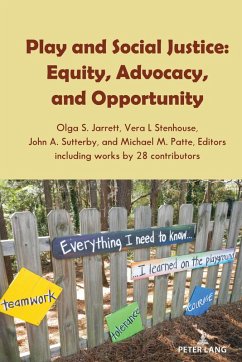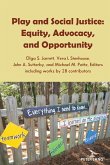The importance of play for healthy development is undeniable. Aspects of play have been linked to the development of social skills, health and fitness, motivation, curiosity, innovation, imagination, and problem solving. Both theory and research suggest that play of various types is critical for healthy development and that playfulness is an important quality across the life span. However, opportunities to play and quality of play facilities in schools, after-school programs, childcare centers, community parks, and museums are not equitable by race, socio-economic status, and ability. And racial profiling, immigrant status, illness, and incarceration interfere with child's play. The first section of the book defines play and social justice and describes disparities in play opportunities in childcare, schools, and communities as well as inequities in how play is interpreted. The next section describes pre-school, elementary, high school, and university programs that use play to liberate, teach, and build community as well as after-school, hospital, and community programs that help to level the playing field of opportunity. The final part of the book discusses ways to ameliorate inequities through research and advocacy. Four research methods are described that are useful for conducting studies on the amount of play children experience, attitudes toward play, and the effect of play on other variables. Finally, a child, a parent, and a teacher describe ways they tried to obtain more recess, using various methods of advocacy. The appendix provides resources indispensable for those convinced that play for all is indeed a social justice issue worthy of advocacy.
Dieser Download kann aus rechtlichen Gründen nur mit Rechnungsadresse in A, D ausgeliefert werden.
"Play and Social Justice: Equity, Advocacy, and Opportunity presents valuable insights into the connections between play and social justice in the lives of children. This is exploration of the topic is an important read for any individual who hopes to create opportunities for children to learn and grow through the process of play while developing the consciousness required to transform their world for the better. It is a welcome addition to the collection of scholarship that aims to humanize the experiences of children and the value of play in our world." - Brian Williams, Director, Alonzo A. Crim Center for Urban Educational Excellence; Clinical Professor, Department of Early Childhood and Elementary Education; College of Education and Human Development, Georgia State University









